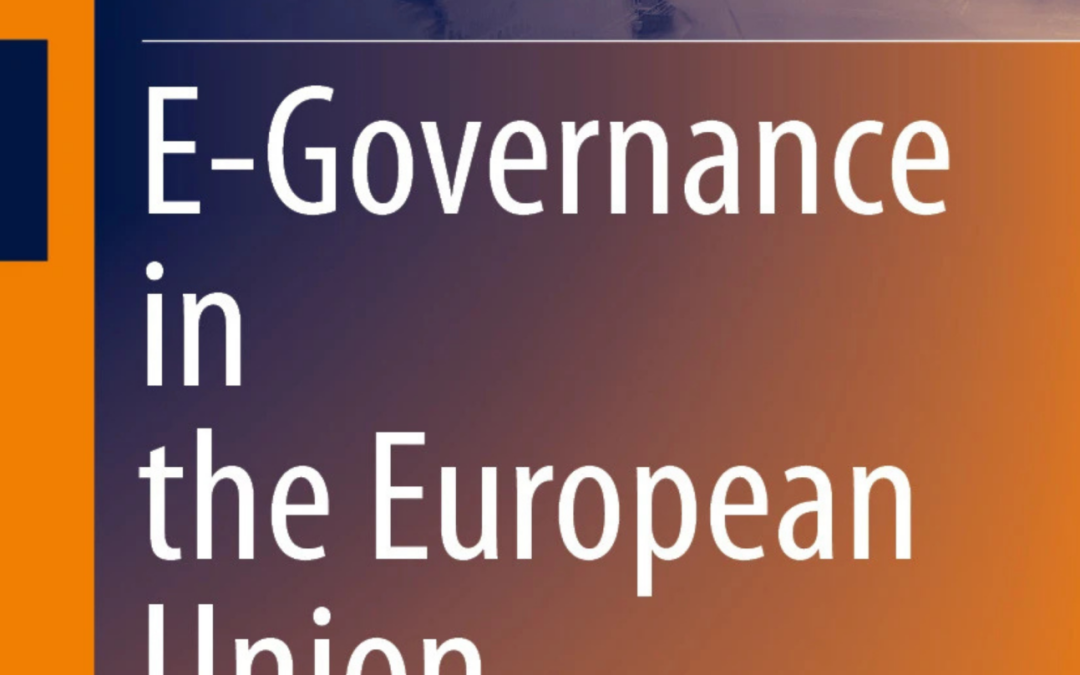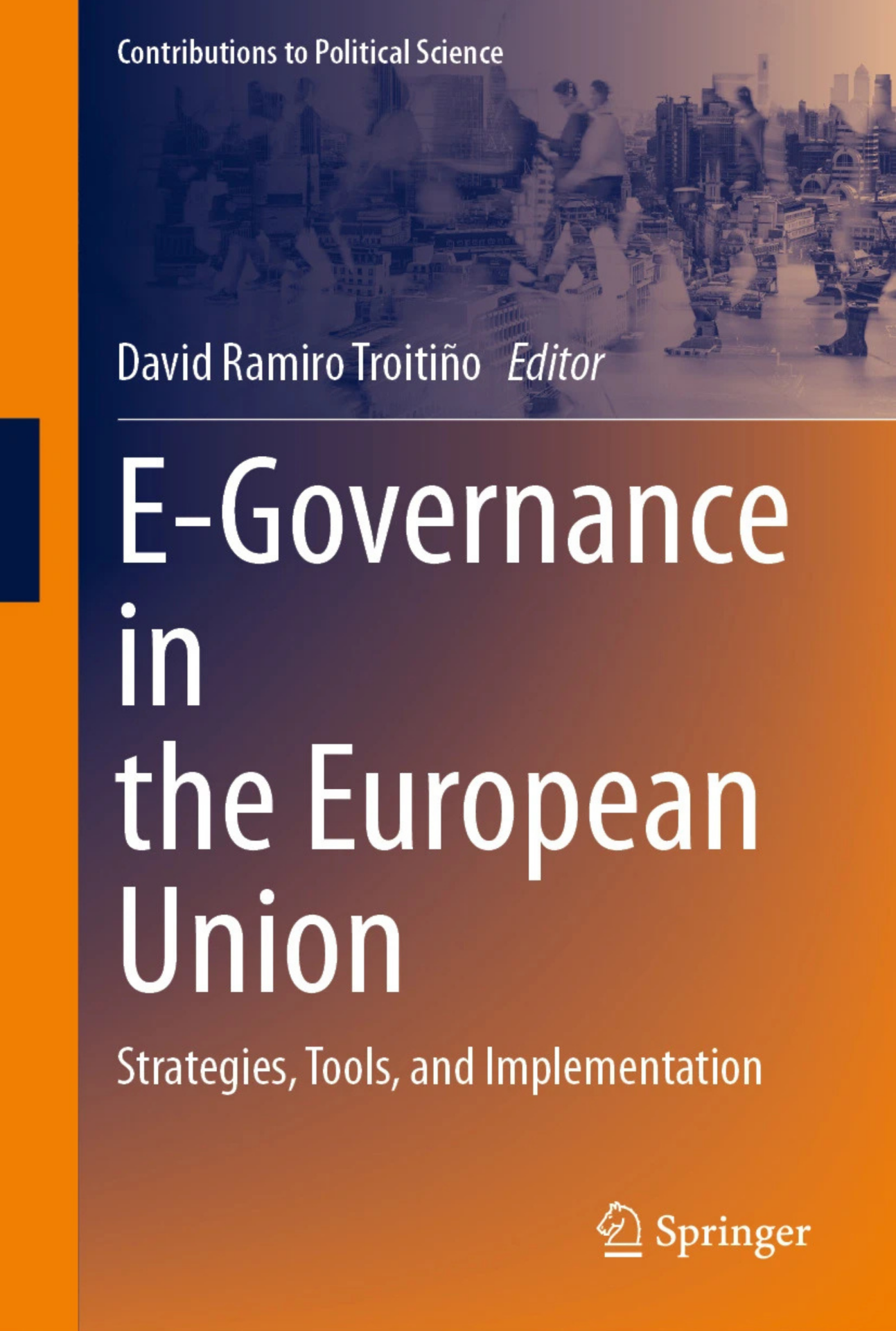Springer Book
E-governance and the European Union: Strategies, Tools, and Implementation
This book sheds new light on the future of e-governance in the European Union (EU). Drawing on the first-hand professional experience of practitioners, policymakers, and institutional stakeholders, combined with a sound academic foundation, it offers insights into successful implementation strategies and new tools necessary for efficient e-governance in the European Union.
The authors present key topics, e.g. the development of e-services such as e-identity, e-health, e-democracy, as well as e-governance tools for the correct implementation of the Digital Single Market. Furthermore, they discuss the legal framework needed for the implementation of these services, such as data protection, digital competition law, as well as EU contracts in digital environments. Finally, the authors highlight efforts to include ethical standards and European values in the decision-making, while developing a vision for the future use of e-governance in the European Union.
The following chapters have been written or co-written by members of the ENDE team.
E-Governance as a Future Option
Author: David Ramiro Troitiño
Pages 1-6
The world is facing a new social revolution: digitalization. It will affect the whole socioeconomic structure and change the social paradigm of our societies. Therefore, we are facing a world change with such an influence as the implementation of agriculture in the Neolithic, the evolutions implemented by ancient Greeks, or the Industrial Revolution. It is a major change in humanity and those who evolve will succeed in a highly interconnected world. Consequently, the European Union must embrace digitalization in order to lead a new era. This publication presents different fronts where digitalization is a priority within the European Union.
Digitalization, Neofunctionalism, and Integration in the European Union
Author: Viktoria Mazur & David Ramiro Troitiño
Pages 7-22
This research focuses on the analysis of the general impact of digital integration in the European Union as a new way to deal with public services and public policies implementation. The perspective of the work is based on the long-term development of the European Union following the spillover effect of neofunctionalism integration theory. Consequently, the European Union is understood as a process, an initiative in progress that has not reached its final shape and requires the innovative approaches to keep the right track of development. As a result, the work explores the potential of digitalization fostering the European integration to a new level in the long process of achieving a stable integrated, wealthy, and peaceful area.
The Strategy of the European Institutions on Digital Integration
Author: Viktoria Mazur & David Ramiro Troitiño
Pages 23-38
Political will and societal support are required within the European Union to improve the situation of the organization addressing current problems and future challenges with innovative approaches based on terms of efficiency. Therefore, e-governance is a priority for the EU institutions, but what they tackle is implementation from different perspectives according to their essence and goals. The European institutions are key actors in the development and implementation of a system of e-governance in the European level. Nevertheless, it is a process facing numerous challenges, as the position of the Member States (not always favouring further integration). E-governance requires a strong political support for its implementation, and consequently the attitude of the EU institutions is crucial. This research analyses the positions of the European Commission, the European Parliament, and the Council, representing three different perspectives, as intergovernmentalism, federalism, and neofunctionalism, to understand the strategy on e-governance of each institution and their common interaction with the development of a common approach.
The Members of the EU and e-Governance, Analysis, and Institutional Support
Author: Viktoria Mazur & David Ramiro Troitiño
Pages 39-55
The investigation focuses on a general analysis of the domestic situation of each Member State of the European Union in terms of e-governance. The internal situation of each individual Member State is different, from the digital approach of Estonia to other States with minimum connection with e-governance. Therefore, the general analysis is required to understand the internal situation of each Member State and the implications it has in the position of the national governments towards the development of e-governance at the EU level. Therefore, analysing the current situation will allow the creation of common standards, foster the integration in digital aspects in the European Union, and allow a concrete mapping for further common developments.
e-Identity: A Step Forward to European Digital Citizenship
Author: Viktoria Mazur & David Ramiro Troitiño
Pages 57-70
The development of e-governance in the European Union opens new possibilities of change in so many aspects of the internal organization of the Union. This research focuses on the innovations and fields to explore in concordance with a common approach to e-governance in the European Union regarding ID card, Mobile IDs, e-Residency card, and Smart IDs. These elements will create a deeper concept of common identity among European citizens and a stronger link between the citizens and the organization of Europe. These tools together will contribute to dissemination and implementation of the concept of common e-identity among the European Union citizens, as their current status will be upgraded with the inclusions of these technological novelties on their common rights.
Digital Social Initiatives: Europe Connecting Citizens with Social Transformation
Author: Viktoria Mazur & David Ramiro Troitiño
Pages 71-85
This study explores the intricate relationship between information and communication technologies (ICTs), civic engagement service innovation, and the challenges posed to traditional welfare systems in the European Union (EU). In the EU, civic engagement innovation is pivotal for democratic governance, demanding a delicate balance between technological advancement and democratic values. Initiatives like the European Citizens’ Initiative (ECI) and the integration of digital platforms underscore the EU’s commitment to shaping an inclusive and participatory European democracy, necessitating ongoing efforts to address challenges such as the digital divide and cybersecurity concerns. Shifting focus, the research comprehensively examines digital social innovation (DSI) within the context of a traditional welfare state facing significant challenges. Through inductive analysis, the study investigates the transformative impact of emerging digital technologies, particularly artificial intelligence, on reshaping welfare systems and addressing social risks. The chapter emphasizes the need for the EU to address societal challenges in the face of digitalization, safeguard its welfare system, and find common solutions aligned with European traditions and societal models.
E-Democracy in the EU
Author: Mateja Rek
Pages 103-115
Digital tools can offer citizens many advantages in their participation in political debates and decision-making processes in the EU. If applied wisely, they can contribute significantly to a more open, accessible, transparent and efficient system of policymaking at all levels of EU multilevel governance. In this way, digitalization can also help to reduce the democratic deficit in the EU. This chapter discusses the opportunities and benefits that digital tools can provide for democracy in the EU, focusing on formal processes of political participation as well as on more informal ways of civic engagement. It is argued that e-participation tools should be developed in a way to facilitate clear and efficient interaction between stakeholders in EU political processes. Such interaction would benefit from an ongoing two-way communication between citizens and policy makers fostering information sharing, mutual understanding, trust and motivation to participate.
General Data Protection Regulation: Current Challenges and Future Directions
Author: Matúš Mesarčík & Ondrej Hamuľák
Pages 117-133
The paper provides a comprehensive analysis of the General Data Protection Regulation (GDPR), with a focus on transparency, fairness, and security in the processing of personal data. The authors examine the provisions of the GDPR, emphasizing the importance of lawful and transparent processing, purpose limitation, data accuracy, and security measures. They also explore the rights of data subjects, including access, rectification, erasure, and data portability, which enhance individual control over personal data. Cross-border data transfers require compliance with GDPR, necessitating adequate safeguards or reliance on specified exceptions. The authors highlight the pivotal role of supervisory authorities in enforcing GDPR, conducting inspections, initiating proceedings, and imposing fines for non-compliance. Private enforcement mechanisms also empower non-profit organizations. Looking ahead, the authors discuss how GDPR can be adapted to emerging technologies such as artificial intelligence and IoT. They also propose amendments to harmonize enforcement practices across EU member states, which will strengthen data protection mechanisms in the face of technological advancements.
European Union Contracts in Digital Environments
Author: Zeynep Ayata
Pages 173-185
One of the most important aims of the Digital Single Market Strategy is to ensure better access to digital services for consumers as traditional contract and consumer law may be inadequate or insufficient in providing protection. When products are faulty, consumers are often uncertain about their rights. Many businesses also hesitate to offer their products to consumers abroad, because of differences in national contract laws. The European Union Commission has initiated many legislative measures to satisfy changing needs of business and consumers in digital spaces. In 2015 the European Commission proposed two directives on contracts for the supply of digital content and digital services and on contracts for the sale of goods. The European Parliament and the Council adopted these Directives on 20 May 2019. Following their publication in the Official Journal, Member States had until 1 July 2021 to transpose them in their national law. The directives harmonise key consumer contract law rules across the EU. The directives aim to ensure a high level of consumer protection and increase legal certainty for both consumers and traders in millions of everyday transactions concerning goods, smart goods, digital content and digital services. This chapter explores the challenges triggered by digitalisation in terms of consumer contracts and examines the solutions proposed in European Union policy and law, focusing in particular on measures provided by the two recent directives.
European Education Area and Digital Education Action Plan (2021–2027): One More Step Towards the Europeanisation of Education Policy
Author: Celso Cancela Outeda
Pages 187-206
The advances and transformations in the field of digital education experienced by the EU cannot be explained solely by technological changes or the COVID-19 crisis. For several decades, other factors such as economic globalisation, xenophobia, terrorism, European identity, etc. have stimulated the adoption of European measures. Today, education is presented as an autonomous and strategic sector in the EU. We are already witnessing the configuration of the European Education Area, which opens the door to a European dimension for education, going beyond the national and the economic towards the adoption of a common, global and integral perspective based on shared values. Moreover, the Digital Education Action Plan (2021–2027) is also a recent EU policy initiative. Its objective is to support the adaptation of the education and training systems of the Member States to the digital age. It is inspired by a common vision of high-quality, inclusive and accessible digital education. Such initiatives, based on the establishment of common standards (standardisation), ultimately promote the Europeanisation of education.



Recent Comments